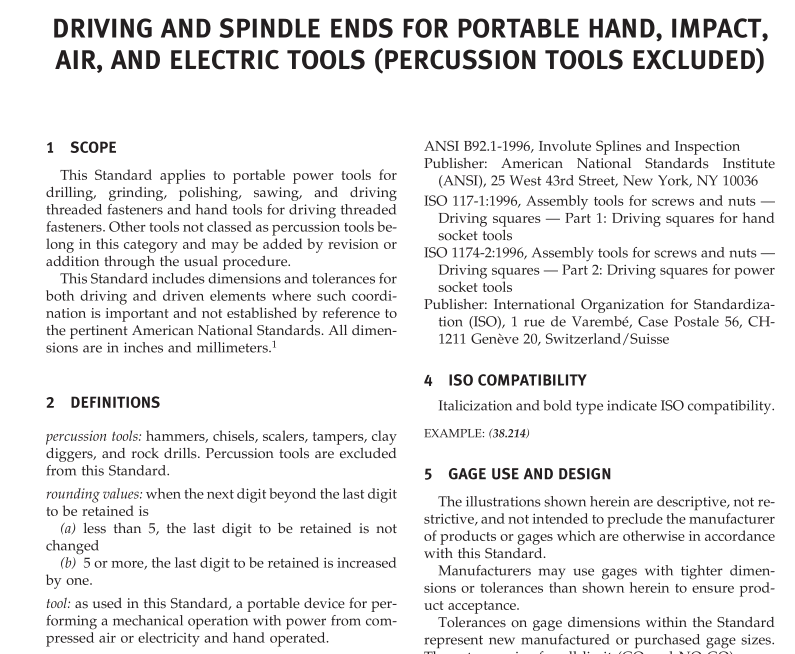ASME B107-4:2005 pdf free download Driving and Spindle Ends for Portable Hand, Impact, Air, and Electric Tools (Percussion Tools Excluded)
1 sCOPE
This Standard applies to portable power tools fordrilling grinding, polishing, sawing, and drivingthreaded fasteners and hand tools for driving threadedfasteners.Other tools not classed as percussion tools be-long in this category and may be added by revision oraddition through the usual procedure.
This Standard includes dimensions and tolerances forboth driving and driven elements where such coordi-nation is important and not established by reference tothe pertinent American National Standards.All dimen-sions are in inches and millimeters.1
DEFINITIONS
percussion tools: hammers, chisels, scalers, tampers, claydiggers, and rock drills. Percussion tools are excludedfrom this Standard.
rounding valiues: when the next digit beyond the last digitto be retained is
(a) less than 5,the last digit to be retained is notchanged
(b 5 or more, the last digit to be retained is increasedby one.
tool: as used in this Standard, a portable device for per-forming a mechanical operation with power from com-pressed air or electricity and hand operated.
3NORMATIVE REFERENCES
The following is a list of publications referenced inthis Standard.
ANSI B1.1-1989R01 Ed,Unified Inch Screw Threads(UN and UNR Thread Form)
ANSI B7.1-2000, Safety Requirements for the Use, Care,and Protection of Abrasive Wheels ANSI B92.1-1996, Involute Splines and Inspection
Publisher: American National Standards Institute(ANSI), 25 West 43rd Street, New York, NY 10036ISO 117-1:1996,Assembly tools for screws and nuts —Driving squares — Part 1: Driving squares for handsocket tools
ISO 1174-2:1996,Assembly tools for screws and nuts —Driving squares — Part 2: Driving squares for powersocket tools
Publisher: International Organization for Standardiza-tion (ISO), 1 rue de Varembeé,Case Postale 56,CH-1211 Geneve 20,Switzerland /Suisse
4lso COMPATIBILITY
Italicization and bold type indicate ISO compatibility.EXAMPLE:(38.214)
5 GAGE USE AND DESIGN
The illustrations shown herein are descriptive, not re-strictive, and not intended to preclude the manufacturerof products or gages which are otherwise in accordancewith this Standard.
Manufacturers may use gages with tighter dimen-sions or tolerances than shown herein to ensure prod-uct acceptance.
Tolerances on gage dimensions within the Standardrepresent new manufactured or purchased gage sizes.The extreme size for all limit (GO and NO Go) gagesshall not exceed the extreme limits of products specifiedwithin the Standard.All variations (manufacturing tol-erance,calibration error,wear allowance,etc.) in thegages, whatever their cause or purpose,shall bring thesegages within the extreme limits of this gage size speci-fied within this Standard. Thus, a gage that representsa minimum limit may be larger, but never smaller , thanthe minimum specified for the product standard; like-wise, the gage that represents a maximum limit may besmaller, but never larger, than the maximum size spec-ified for the product standard.
ASME B107-4:2005 pdf free download
